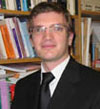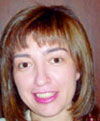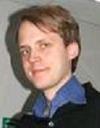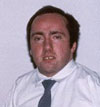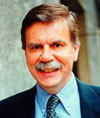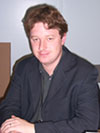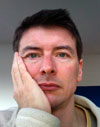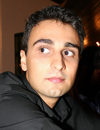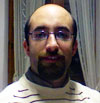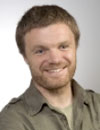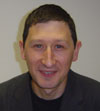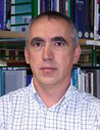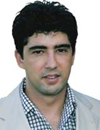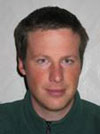D-Lib Magazine
|
Ian G. Anderson
Ian Anderson is Lecturer in New Technologies for the Humanities in the Humanities Advanced Technology and Information Institute at the University of Glasgow where he teaches on the MSc in Information Management and Preservation as well as a range of undergraduate courses. His research interests include evaluating archive user needs, online archive systems, visualising archival information, digitisation and historical informatics. His research has received funding from the Gladys Krieble Delmas Foundation and the UK's Arts and Humanities Research Council and he has recently completed an AHRC Speculative Research Grant conducting experimental research on a multidimensional visualisation of online finding aids. As part of the AX-SNet group of researchers his work is contributing to the international development and promotion of user focused archival research.
To return to Ian Anderson's article, click (here).
Ana Alice Baptista
Assistant Professor at the Department of Information Systems of University of Minho, Ana Alice Baptista graduated as a Systems and Informatics Engineer, obtained a MSc degree in Informatics and a Doctor degree in Information Technologies and Systems. She publishes in the areas of Scholarly Communication, Digital Libraries and Semantic Web. She is also interested in the social aspects of the Internet, primarily on its relationships with scholarly communication.
To return to Ana Alice Baptista's article, click (here).
Tobias Blanke
Tobias Blanke works at the crossover of arts and humanities and computing sciences approaches. Currently, he is working as a Research Associate at the Arts and Humanities e-Science Support Centre (http://www.ahessc.ac.uk) at King's College London. He is researching the use of e-Science technologies in the arts and humanities. His personal research interests are recently focused on formal semantics in computing and knowledge management for the humanities. Tobias holds a Ph.D. on Political Philosophy from the Free University Berlin as well as a MSc of Advanced Computing Methods from the University of London.
To return to Tobias Blanke's workshop report, click (here).
Alessandro Campi
Alessandro Campi is researcher at the Politenico di Milano, his works exploit the possibility of extending XQuery in several directions, more precisely, the possibility to add active rules, to execute fuzzy queries, to mine data and to draw the query without writing directly XQuery. Other research activities are related to investigating automatic construction and verification of data intensive Web site and on methodologies and tools for e-learning. He taught Programming languages, Data Structures and Algorithms, Database and Software Engineering at the Politecnico di Milano.
To return to Alessandro Campi's article, click (here).
Stefano Ceri
Stefano Ceri is professor at the Dipartimento di Elettronica e Informazione, Politecnico di Milano. His research interests are focused on query languages for XML and on models, methods and tools for data-intensive WEB sites. He is chairman of LaureaOnLine and vice-director of Alta Scuola Politecnica. He is responsible for the Politecnico of several EU-Funded Projects, including Cooper (2006-08) and ProLearn (2005-2008). He is inventor of WebML and founder of Web Models (www.webratio.com). He is editor in chief of the book series "Data Centric Systems and Applications" (Springer-Verlag), author of 9 international books and over 200 articles.
To return to Stefano Ceri's article, click (here).
Stuart Dunn
Stuart Dunn is a Research Associate at the Arts and Humanities e-Science Support Centre (http://www.ahessc.ac.uk) At King's College London. He received a Ph.D. in Aegean Bronze Age Archaeology from the University of Durham in 2002. His current research interests include service-oriented computing in the humanities, the fields of Minoan paleoenvironment and chronology, and computational methods in geospatial archaeology. He is a member of the 'Virtual Research for Archaeology' (VERA) project steering committee, and the JISC Geospatial Data Workgroup. With colleagues at AHeSSC, he is a co-leader of the Arts and Humanities Theme at the e-Science Institute in Edinburgh (http://www.ahessc.ac.uk/theme), and a Visiting Research Fellow in the School of Human and Environmental Sciences (archaeology department) at the University of Reading.
To return to Stuart Dunn's workshop report, click (here).
Erik Duval
Erik Duval is professor at the computer science department of the Katholieke Universiteit Leuven. His research interests include metadata in a wide sense, learning object metadata in particular, and how they enable finding rather than searching, a global learning infrastructure based on open standards, human-computer interaction in an effort to "hide everything but the benefits". Erik is the president of the ARIADNE Foundation and the chair of the IEEE LTSC Learning Object Metadata working group.
To return to Erik Duval's article, click (here).
Miguel Ferreira
Miguel Ferreira is a Systems and Informatics Engineer, working as a consultant at the Oporto's Regional Archive and as a researcher at the University of Minho. Since 2003, has been publishing in the field of digital archives, libraries and preservation. Currently, Ferreira is developing work as a Ph.D. student and coordinating several research projects at the Oporto's Regional Archive, the Portuguese Centre of Photography and at the Portuguese National Archives.
To return to Miguel Ferreira's article, click (here).
Sam Guinea
Sam Guinea is a post-doc at Politecnico di Milano. His Ph.D. thesis is centred on the run-time supervision (monitoring and recovery) of complex service-based systems. He has taught both Software Engineering and Computer Science courses at Politecnico di Milano since 2004; where he has also been the co-advisor of several master theses in Service-oriented systems. He has been involved in several projects financed by the EU commission.
To return to Sam Guinea's article, click (here).
Edwin Klijn
Edwin Klijn is currently working as Project Manager Digitization for the project Databank of Digital Daily Newspapers at the Koninklijke Bibliotheek (the National Library of the Netherlands). From 1999 he has been involved in several digitization and preservation projects for the European Commission on Preservation and Access and the Royal Netherlands Academy of Arts and Sciences. He is co-author of 'In the Picture. Digitization and Preservation of European Photographic Collections' (2000) and 'SEPIADES. Recommendations for cataloguing photographic collections' (2003).
To return to Edwin Klijn's article, click (here).
David Massart
David Massart is Senior Software Architect at the European Schoolnet. He works on architectures, interoperability and standards for distributed e-learning applications. He is responsible for the design and development of the current LRE brokerage system and associated tools. David is member of the technical board of the IMS global learning consortium and co-chair of the IMS project group on 'Learning Object Discovery and Exchange'. He is co-editor of CWA 15454: A Simple Query Interface Specification for Learning Repositories. David holds a Ph.D. in information science from the Free University of Brussels (ULB).
To return to David Massart's article, click (here).
Michael L. Nelson
Michael L. Nelson joined the Computer Science Department at Old Dominion University in 2002. He worked at NASA Langley Research Center from 1991-2002. Through a NASA fellowship, he spent the 2000-2001 academic year at the School of Information and Library Science, University of North Carolina at Chapel Hill. His research interests include repository-object interaction and digital preservation.
To return to Michael Nelson's article, click (here).
Eloy Rodrigues
Eloy Rodrigues is the Director of the University of Minho Documentation Services. He has devoted much of his work to the development of digital libraries, education and training of librarians and library users. In 2003, Rodrigues led the project to create RepositoriUM – the institutional repository of the University of Minho – and has directed this service ever since. At the end of 2004 he drafted the formal policy of University of Minho on open access to its scientific output. He is been involved in several projects and activities related with the promotion and advocacy of Open Access and institutional repositories in Portugal, Europe, and throughout the Portuguese-speaking world.
To return to Eloy Rodrigues's article, click (here).
Ricardo Saraira
Ricardo Saraiva works for the Documentation Services of the University of Minho and is the communication and user support officer of RepositoriUM – the Institutional Repository of the University of Minho. Since 2004, he is has been involved in the promotion, communication and user support of various Open Access related activities and projects. Currently, he is pursuing a MSc in Information Science.
To return to Ricardo Saraiva's article, click (here).
Joan A. Smith
Joan A. Smith is a doctoral candidate in computer science at Old Dominion University. Her industry experience includes nearly 15 years as a computer specialist in positions ranging from systems administration to software engineering director. She was the eighth recipient of the CLIR Zipf Fellowship, and was invited to the first Google Workshop for Women Engineers. She is currently completing her dissertation, "Integrating Preservation Functions into the Web Server."
To return to Joan Smith's article, click (here).
Stefaan Ternier
Stefaan Ternier is a research and teaching assistant at the computer science department of the Katholieke Universiteit Leuven where he is about to finish his Ph.D. His research interests are in architectures for learning objects and interoperability. In that respect, he participated in ProLearn (a 'Network of Excellence' financed by the Information Society Technology programme of the European commission) and co-authored the Simple Query Interface (a CEN ISSS standard). At the time of writing, he is involved with the MACE and MELT eContent+ projects, GLOBE (an international consortium that provides a distributed network of learning objects), the standardization of the Simple Publishing Interface in CEN ISSS and is responsible for the development of the ARIADNE Knowledge Pool System.
To return to Stefaan Ternier's article, click (here).
Copyright © 2008 Corporation for National Research Initiatives
Top | Contents
Search | Author Index | Title Index | Back Issues
E-mail the Editor
doi:10.1045/january2008-authors
